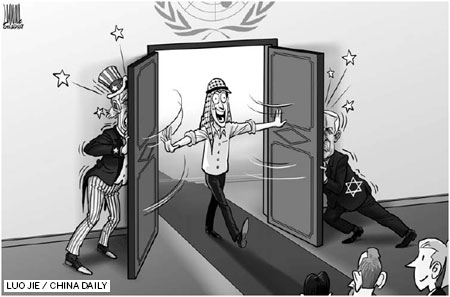UN vote could revive peace process
Updated: 2012-12-01 07:49
By Wang Hui (China Daily)
|
|||||||||

Palestine won a landslide victory in the United Nations on Thursday in its journey toward statehood, with the world body voting to elevate its status from an "entity" to a "non-member observer state". With symbolic but implicit recognition of Palestine's statehood, the UN vote embodies the international community's rising support for Palestinian people's righteous claim.
Equally importantly, it presents a good opportunity for countries like the United States to step up their mediation in the Middle East peace process. In fact, if US President Barack Obama is serious about honoring his commitment, Washington has to achieve a breakthrough in the stalled Middle East peace talks.
Delivering a speech in Cairo more than three years ago, Obama extended an olive branch to the entire Muslim world and pledged to pursue peace in the Middle East. But contrary to his promise, the division and enmity between the Palestinians and Israelis have deepened, and the Gaza Strip is reeling from the shock of an eight-day exchange of fire between Israel and Hamas.
That the UN General Assembly has voted overwhelmingly in favor of Palestine should drive home the point that the US is not only losing its moral high ground, but also becoming increasingly isolated in its stance on the Palestinian-Israeli conflict. For years, it has supported Israel, drawing widespread criticism and indignation from the Arab world.
Along with Israel, its closest ally in the region, the US throttled Palestine's first bid for full UN membership last year. It vehemently opposed Palestine's second bid for non-membership status this year and voted against it on Thursday despite Obama's statement in Cairo in 2009 that he wanted to see the state of Palestine as a UN member.
Commenting on Thursday's vote, US State Department spokeswoman Victoria Nuland said Washington would keep coaxing Israelis and Palestinians to return to the negotiating table. But the US has to match its words with concrete deeds to help the cause of the people in the region.
If Obama wants to accomplish anything meaningful in the region during his second term in office, he has to review his Middle East policy thoroughly. And breaking the Palestinian-Israeli deadlock should be only one facet of this review, because many of the region's problems can be traced to the US' failure to engage with the Muslim world.
Three years ago when Obama said in Cairo that the US wanted closer ties with the Muslim world, Muslims across the world expected a lot from Washington. Today, the Muslim world, especially the Middle East, is burning with anti-American sentiments, which is pushing it deeper into instability and raising the concerns of the international community.
This week alone has seen the deaths of hundreds of people in Syria, Iraq and Egypt, albeit in different forms of violence. Thursday was the most violent day in Iraq in more than two months. A total of 42 people were killed in waves of bomb attacks that targeted Shiite Muslims and security forces, reminding the world once again of Iraq's tricky security situation.
Clashes among ethnic groups and religious sects have become routine since the withdrawal of US combat troops at the end of last year. Self-governance, peace and stability, as promised by US officials, have remained a distant dream for Iraqis, who have paid and will continue to pay a dear price as victims of US policy.
Now, media reports in the Middle East are saying that about 3,000 US troops returned to Iraq recently to be redeployed in the country's two provinces bordering Syria. In another development, NATO is reportedly mulling deploying 18 to 20 Patriot missiles along the border between Turkey and Syria. If media reports on the redeployment of US troops are true, it could mean Washington is preparing for another regime change in the region. And NATO's maneuvering could be seen as another step toward achieving that goal.
Washington should know that a forcible regime change in the Middle East would have grave consequences on the region and beyond. When will the US realize that intervention is not the right way of improving its image in the Middle East or engaging with the region?
The author is a senior writer with China Daily. E-mail: wanghui@chinadaily.com.cn
(China Daily 12/01/2012 page5)

 Relief reaches isolated village
Relief reaches isolated village
 Rainfall poses new threats to quake-hit region
Rainfall poses new threats to quake-hit region
 Funerals begin for Boston bombing victims
Funerals begin for Boston bombing victims
 Quake takeaway from China's Air Force
Quake takeaway from China's Air Force
 Obama celebrates young inventors at science fair
Obama celebrates young inventors at science fair
 Earth Day marked around the world
Earth Day marked around the world
 Volunteer team helping students find sense of normalcy
Volunteer team helping students find sense of normalcy
 Ethnic groups quick to join rescue efforts
Ethnic groups quick to join rescue efforts
Most Viewed
Editor's Picks

|

|

|

|

|

|
Today's Top News
Health new priority for quake zone
Xi meets US top military officer
Japan's boats driven out of Diaoyu
China mulls online shopping legislation
Bird flu death toll rises to 22
Putin appoints new ambassador to China
Japanese ships blocked from Diaoyu Islands
Inspired by Guan, more Chinese pick up golf
US Weekly

|

|







